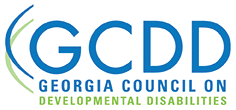GCDD Response to Proposed DBHDD Budget Cuts
June 10, 2020
The Honorable Renee Unterman Chair,
Senate Human Development and Public Health Appropriations Subcommittee
State Capitol, Room 121-G
Atlanta, GA 30334
The Honorable Katie Dempsey Chair,
House Human Resources Appropriations Subcommittee
State Capitol, Room 245
Atlanta, GA 30334
Dear Senator Unterman and Representative Dempsey,
The Georgia Council on Developmental Disabilities writes today in reaction to the significant budget cuts proposed to the Department of Behavioral Health and Developmental Disabilities (DBHDD), which were made public on May 26, 2020. This is a unique time in our state’s history, and we recognize that the dire effects of the COVID-19 pandemic will likely cause Georgia to face a significant budget deficit which will result in difficult decisions being made. We now have access to what those decisions might mean for Georgians with developmental disabilities and have serious concerns about the long-term impacts of these cuts on a community that has already been disproportionately impacted by the COVID-19 pandemic itself.
In addition to considering a 14%1 budget cut, which is more than $3.5 billion in state funds, the Council asks that state leaders also consider methods of bringing additional funds into Georgia in an attempt to minimize the impact of cuts on critical supports and services, including:
1 On June 3, 2020, Governor Brian Kemp indicated a reduction in cuts equaling 11% cuts for each state agency. We are monitoring how this announcement might affect DBHDD’s proposal.
1. Maximizing Federal Funding
The Council encourages state leaders to maximize federal funding through continued discussions with Congress regarding the need of additional emergency funding to states, including the additional Home and Community Based funds currently being proposed. Leaders in Congress have indicated interest in providing additional federal funds to states, and we would be encouraged to know that state leaders are working hard to pull down those dollars in an attempt to offset some of the proposed cuts. As a Council, we will continue to call on our advocates to reach out to members of Congress.
2. Acknowledging and Addressing DBHDD’s Over Reliance on State Funds
The Council remains concerned about the disproportionate impact these proposed cuts will have on DBHDD, including the complete elimination of family support dollars, given the agency’s significant reliance on state funds as a primary funding stream. We think it is vital to compare how we leverage federal funds to support people with disabilities compared to our neighboring states and the nation. When you look at the numbers, you will see that Georgia is 50th in the nation and last in the Southeast in leveraging federal match to support people with disabilities. Currently, Georgia’s federal-state I/DD Medicaid spending makes up only 55.4% of our total I/DD spending, compared to the national average of 75.7%, and the southeastern average of 80%. We think we have work to do as a state to learn from our neighbors and leverage federal dollars so that we aren’t in this serious predicament a few years from now when we might be looking at additional cuts to state spending. The Council is calling on members of the General Assembly to create a study committee aimed at increasing and improving DBHDD’s use of federal dollars.
3. Increase Georgia’s Revenue Streams
Finally, the Council asks that state leaders look for areas to increase revenue in Georgia. We realize that discussions have been ongoing regarding ways to increase revenue and strongly believe that now is the time to implement those long-researched strategies aimed at increasing state revenue. One such strategy is to increase Georgia’s tobacco tax. At 37 cents, Georgia ranks 49th compared to other states regarding tobacco tax. The national tobacco tax average is $1.81, and if Georgia raises the tobacco tax only to $1, it has been shown that the policy change could bring in approximately $400 million a year in revenue. When the Department of Behavioral Health and Developmental Disabilities (DBHDD) is proposing approximately $172.3 million in cuts, with the majority of those cuts coming directly from supports and services aimed at assisting Georgia’s most vulnerable, the Council remains hopeful that our state leaders will prioritize those supports and services by ensuring an increase in tobacco tax revenue.
As members of the General Assembly begin to consider where budget cuts must be made, the Council asks that members of the General Assembly keep in mind the limited supports that are currently available to people with developmental disabilities and their families, with over 6,000 people on waiting list for services, many of those families waiting decades to finally receive services. Georgians across the state have raised continued concerns about the current waitlist numbers and the lack of new NOW/COMP wavier slots in the current proposal, which is evident in the current online petition signed by approximately 20,000 Georgians. Cuts to the budget must be made with these families in mind, recognizing that the solution cannot be to simply eliminate entire programs and supports to a community that is already experiencing some of the greatest need in Georgia.
We greatly appreciate the longstanding history of support the General Assembly has shown to our community, and we thank you for your time and consideration during these difficult times. The Georgia Council on Developmental Disabilities stands ready to assist you with additional data, strategies, and insight as requested.
Sincerely,
Eric E Jacobson
Executive Director
Georgia Council on Developmental Disabilities
Parker Glick
Council Chair
Georgia Council on Developmental Disabilities
Cc: Governor Brian Kemp
Lt. Governor
Download the pdf of the letter.
